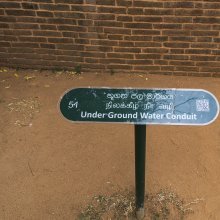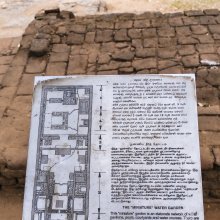Jalamarga, Jalamārga, Jala-marga: 14 definitions
Introduction:
Jalamarga means something in Hinduism, Sanskrit, Marathi. If you want to know the exact meaning, history, etymology or English translation of this term then check out the descriptions on this page. Add your comment or reference to a book if you want to contribute to this summary article.
Images (photo gallery)
In Hinduism
Vastushastra (architecture)
Source: Wisdom Library: Vāstu-śāstraJalamārga (जलमार्ग) refers to the “groove” cut within the praṇāla (‘water-drain’). More specifically, it is cut deeply on the upper surface of the lower beam, and the lower surface of the upper beam, forming a long stone chute when placed one above the other. It is also known by the name Ambumārga. The praṇāla is a channel built into a sanctum for the purpose of draining oblation water and rainwater.
Source: OpenEdition books: Architectural terms contained in Ajitāgama and RauravāgamaJalamārga (जलमार्ग) refers to “drain § 4.36.”.—(For paragraphs cf. Les enseignements architecturaux de l'Ajitāgama et du Rauravāgama by Bruno Dagens)

Vastushastra (वास्तुशास्त्र, vāstuśāstra) refers to the ancient Indian science (shastra) of architecture (vastu), dealing with topics such architecture, sculpture, town-building, fort building and various other constructions. Vastu also deals with the philosophy of the architectural relation with the cosmic universe.
Jyotisha (astronomy and astrology)
Source: Wisdom Library: Brihat Samhita by VarahamihiraJalamārga (जलमार्ग) refers to a “sea-course”, according to the Bṛhatsaṃhitā (chapter 15) (“On the nakṣatras—‘asterisms’”), an encyclopedic Sanskrit work written by Varāhamihira mainly focusing on the science of ancient Indian astronomy astronomy (Jyotiṣa).—Accordingly, “Those who are born on the lunar day of Mūla will be druggists, heads of men, dealers in flowers, roots, fruits and seeds; will be rich (atidhana-yukta) and will delight in garden work. Those who are born on the lunar day of Pūrvāṣāḍha will be of gentle manners; fond of sea-voyage (jalamārga-gāmin), truthful, cleanly and wealthy; will delight in earth work; will be boatmen; will be dealers in fruits and flowers of water. [...]”.

Jyotisha (ज्योतिष, jyotiṣa or jyotish) refers to ‘astronomy’ or “Vedic astrology” and represents the fifth of the six Vedangas (additional sciences to be studied along with the Vedas). Jyotisha concerns itself with the study and prediction of the movements of celestial bodies, in order to calculate the auspicious time for rituals and ceremonies.
Languages of India and abroad
Marathi-English dictionary
Source: DDSA: The Molesworth Marathi and English Dictionaryjalamārga (जलमार्ग).—m (S Water-road.) Water (opp. to land) considered as a way for traveling; the way by water. 2 Sea-customs: opp. to jakāta.
Source: DDSA: The Aryabhusan school dictionary, Marathi-Englishjalamārga (जलमार्ग).—m Water (opp. to land) consi- dered as a way for travelling. The way by water. Sea-customs, opp. jakāta.
Marathi is an Indo-European language having over 70 million native speakers people in (predominantly) Maharashtra India. Marathi, like many other Indo-Aryan languages, evolved from early forms of Prakrit, which itself is a subset of Sanskrit, one of the most ancient languages of the world.
Sanskrit dictionary
Source: DDSA: The practical Sanskrit-English dictionaryJalamārga (जलमार्ग).—a drain, canal.
Derivable forms: jalamārgaḥ (जलमार्गः).
Jalamārga is a Sanskrit compound consisting of the terms jala and mārga (मार्ग).
Source: Cologne Digital Sanskrit Dictionaries: Shabda-Sagara Sanskrit-English DictionaryJalamārga (जलमार्ग).—m.
(-rgaḥ) A drain or issue from a pond, &c. E. jala water, and mārga a road, a water-course. jalasya tadvāhasya mārgaḥ .
Source: Cologne Digital Sanskrit Dictionaries: Cappeller Sanskrit-English DictionaryJālamārga (जालमार्ग).—[masculine] the way of the window; [instrumental] through the window.
Source: Cologne Digital Sanskrit Dictionaries: Monier-Williams Sanskrit-English Dictionary1) Jalamārga (जलमार्ग):—[=jala-mārga] [from jala] m. = -nirgama, [cf. Lexicographers, esp. such as amarasiṃha, halāyudha, hemacandra, etc.]
2) Jālamārga (जालमार्ग):—[=jāla-mārga] [from jāla] m. the way through the window, [Mālatīmādhava]
Source: Cologne Digital Sanskrit Dictionaries: Yates Sanskrit-English DictionaryJalamārga (जलमार्ग):—[jala-mārga] (rgaḥ) 1. m. A drain or issue from a pond, &c.
[Sanskrit to German]
Sanskrit, also spelled संस्कृतम् (saṃskṛtam), is an ancient language of India commonly seen as the grandmother of the Indo-European language family (even English!). Closely allied with Prakrit and Pali, Sanskrit is more exhaustive in both grammar and terms and has the most extensive collection of literature in the world, greatly surpassing its sister-languages Greek and Latin.
Kannada-English dictionary
Source: Alar: Kannada-English corpusJalamārga (ಜಲಮಾರ್ಗ):—
1) [noun] the passage by sea through which ships normally sail.
2) [noun] a passage, pipe, through which water is supplied to a building.
3) [noun] any passage for water, as canal, drainage, etc.
--- OR ---
Jāḷamārga (ಜಾಳಮಾರ್ಗ):—[noun] an opening in the wall of a house for ventilation; a ventilator.
Kannada is a Dravidian language (as opposed to the Indo-European language family) mainly spoken in the southwestern region of India.
Nepali dictionary
Source: unoes: Nepali-English DictionaryJalamārga (जलमार्ग):—n. 1. waterway; sea passage; 2. canal; 3. drainage;
Nepali is the primary language of the Nepalese people counting almost 20 million native speakers. The country of Nepal is situated in the Himalaya mountain range to the north of India.
See also (Relevant definitions)
Starts with: Jalamargagamin.
Query error!
Full-text: Jalamargagamin, Payamarga, Jalmaarg, Sthalamarga, Khushaki, Ambumarga.
Relevant text
No search results for Jalamarga, Jalamārga, Jala-marga, Jala-mārga, Jālamārga, Jāla-mārga, Jāḷamārga, Jāḷa-mārga; (plurals include: Jalamargas, Jalamārgas, margas, mārgas, Jālamārgas, Jāḷamārgas) in any book or story.


